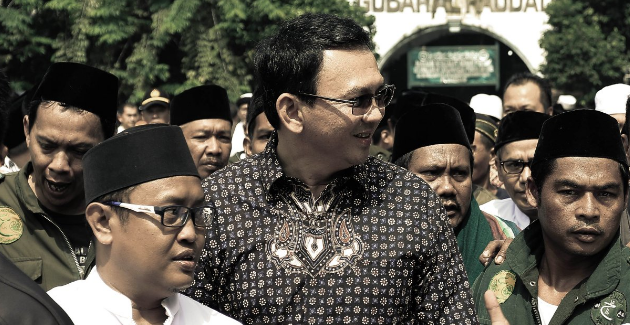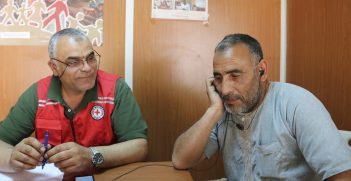Jakarta's Election: Indonesian Democracy in Microcosm

This year’s election in Jakarta is a proxy battle between the larger forces of Indonesia’s national politics. If the incumbent, Ahok, loses on 19 April, it will be a victory for those seeking to unseat President Jokowi in 2019 as well as Islamic conservatives.
On 19 April, the residents of Jakarta will vote in the second round of the gubernatorial elections to determine the next governor of the Indonesian capital.
The initial three candidates have been whittled down to two, after the first vote in mid-February failed to deliver to any of them a simple majority.
On the surface it seems not much cause for attention. What is going on here though is much deeper; it has sharply divided the city of 10 million, putting Indonesia’s religious tolerance and pluralism to the test and potentially setting the tone for the country’s democracy going forward.
The incumbent Governor Basuki Tjahaja Purnama, popularly known as Ahok, took over the role in 2014 when his friend, and then Jakarta Governor, Joko Widodo (known as Jokowi), won a fiercely contested battle for the presidency. Ahok easily continued with the reformist program of his predecessor—clearing out slum areas near rivers and moving people into new apartments, improving drainage to better handle the deluge of rains and putting in place measures to track expenditure and make bureaucracy accountable.
His brash and uncompromising style has rankled many, however. He’s faced fire for his handling of the city’s poorer residents, and questions have been raised about his links to a controversial sea-shore development. The disquiet did not dent a high approval rating though as people saw him getting things done in a city that was weary of corruption and inaction.
Throughout this campaign, Ahok has faced growing hostility over his ‘double-minority’ status as a Chinese-Indonesian and as a Christian in a majority Muslim nation. If he wins, he will be the first directly elected non-Muslim leader of the capital city.
While Ahok knew early on that his status would make him a target, the extent to which issues around religion and race have dominated the election has been a shock.
Conservative Islamic groups say the Koran prohibits Muslims for voting for a Christian leader, and this issue has now become a central feature of the gubernatorial election.
On the campaign trail last year, Ahok made comments that his opponents were misleading voters over the use of a verse in the Koran. The moment was seized upon by hardline groups. They demanded Ahok’s resignation and accused him of blasphemy. They organised mass rallies which attracted hundreds of thousands of people, not only ultra-conservatives but also many mainstream Muslims who felt offended by the comments.
Ahok was later charged with blasphemy and during the election period has been attending court sessions in a trial where he faces five years in jail if convicted.
He has apologised to those who felt offended and denied any wrongdoing. The trial has been delayed until after the election, partly due to police concerns about security.
The election has also revealed the deep ambitions of some of Indonesia’s elites and turned into a proxy battle between the nation’s political heavyweights.
Facing Ahok in the election is Anies Baswedan, a former Minister of Education and Culture. He was a strong supporter of Jokowi. That has all changed, and Mr Baswedan is being supported by the Gerindra Party in his bid for the Governor’s role. Mr Baswedan is a high-profile figure with a significant amount of public support and now the only Muslim candidate in the election. The Chairman of the Gerindra Party, Prabowo Subianto, failed in his bid for the presidency in 2014 by a margin of around 6 per cent. With the Jakarta election, he is back-in-the-game.
Anyone who was in Indonesia for the 2014 election will remember it as a particularly tough and partisan battle, which saw a member of the traditional elite face a relative outsider, Jokowi, perceived to be more in touch with ordinary people.
Interestingly this “outsider” president is backed by the PDIP party and its patron, Megawati Soekarnoputri. Jokowi has been navigating difficult terrain as he tries to initiate reforms and his nation-building program while dealing with Indonesia’s political realities.
The other contender in the first round of Jakarta gubernatorial election was Agus Harimurti Yudhoyono, son of the former President Susilo Bambang Yudhoyono. The former leader has denied accusations that he has helped fund the anti-Ahok campaign.
Three of the biggest names in Indonesian politics are in the election space; and many see the divisive contest as part of a plan to unseat Jokowi in 2019. Analysts figure that if religion proves to be a significant factor, the votes of the younger Yudhoyono will go to the remaining Muslim candidate Mr Baswedan.
It is hard to know what the outcome will be. The first round of voting revealed a margin of just 3 per cent separating Ahok and Baswedan.
The city and the nation are waiting to see what direction this election will take them.
Helen Brown is a former Indonesia correspondent now based in Melbourne for ABC News.
This article is published under a Creative Commons Licence and may be republished with attribution.





